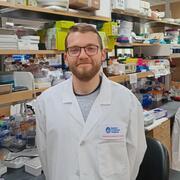Research Fellow, Vascular Biology Program, Boston Children's Hospital
Research Fellow, Harvard Medical School
Ingo received his PhD from the Institute for Hygiene and Microbiology in Würzburg, Germany. During his PhD project he was interested in the function of sphingolipids in the brain endothelium during infection with the bacterial pathogen Neisseria meningitidis. He discovered that the infection leads to the activation of the SPHK1-S1PR2-EGFR axis and that reversing this effect is a promising strategy to prevent bacterial invasion.
Ingo joined the lab in November 2024 for his postdoctoral studies, where he will investigate the epigenetic regulation of S1PRs during neonatal meningitis.
Publication highlights:
Peters S, Fohmann I, Rudel T, Schubert-Unkmeir A (2021) A Comprehensive Review on the Interplay between Neisseria spp. and Host Sphingolipid Metabolites. Cells.
Fohmann I, Weinmann A, Schumacher F, Peters S, Prell A, Weigel C, Spiegel S, Kleuser B, Schubert-Unkmeir A (2023). Sphingosine kinase 1/S1P receptor signaling axis is essential for cellular uptake of Neisseria meningitidis in brain endothelial cells. PLOS Pathogens.
Batliner M, Schumacher F, Wigger D, Vivas W, Prell A, Fohmann I, Köhler T, Schempp R, Riedel A, Vaeth M et al (2024) The Candida albicans quorum-sensing molecule farnesol alters sphingolipid metabolism in human monocyte-derived dendritic cells. mBio.
E-mail: Ingo.fohmann@childrens.harvard.edu
